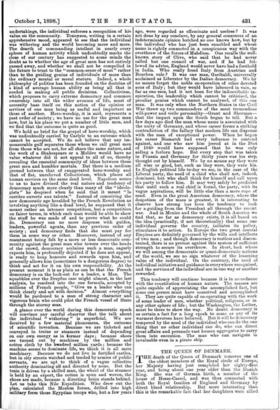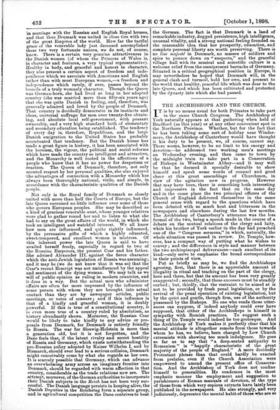THE QUEEN OF DENMARK. T HE death of the Queen of
Denmark removes one of the oldest members of the Royal circle of Europe, her Majesty having just completed her eighty-first year, and being about one year older than the Danish King. She was of German birth, a member of the house of Hesse-Cassel, and was thus connected with both the Royal families of England and Germany by direct blood relationship. But more interesting than this is the remarkable fact that her daughters were allied in marriage with the Russian and English Royal houses, and that thus Denmark was united in close ties with two of the great Empires of the world. How far the tactful grace of the venerable lady just deceased accomplished these two very fortunate unions, we do not, of course, know. There is a certain very genuine attractiveness in the Danish women (of whom the Princess of Wales is, in character and features, a very typical representative). Healthy in body, and graceful and honest in character, they also present a certain aspect of freedom and inde- pendence which we associate with Americans and English rather than with most European women,—a freedom and independence which rarely, if ever, passes beyond the bounds of a truly womanly character. Though the Queen was German-born, she bad lived so long in her adopted country (she was married more than fifty-six years ago) that she was quite Danish in feeling, and, therefore, was generally admired and loved by the people of Denmark. That country is decidedly democratic in its instincts and ideas, universal suffrage for men over twenty-five obtain- ing, and absolute local self-government, with peasant ownership, and a very high standard both of elementary and secondary education being established. The tendency of every day is, therefore, Republican, and the large Danish emigration to the United States has probably accentuated that tendency. But the Danish house has made a great figure in history, it has been associated with the heroism, the vigour, the political and social reforms which have made the country so intelligent and attractive, and the Monarchy is well rooted in the affections of a people who know that it has no power for despotism or reaction. The Queen of Denmark, therefore, not only secured respect by her personal qualities, she also enjoyed -the advantages of connection with a Monarchy which has .always been thoroughly national, virile, and simple, in. accordance with the characteristic qualities of the Danish .people.
Not only is the Royal family of Denmark so closely united with more than half the Courts of Europe, but the late Queen exercised no little influence over some of those who govern European peoples. She may be described as a kind of gracious venerable aunt, whose younger relatives were glad to gather round her and to listen to what she had to say on the great affairs of the world, in which she took an intelligent and watchful interest. We all know how men are influenced, and quite rightly influenced, by the persuasive gifts of which a highly educated, sweet-tempered, and excellent woman is mistress. Of this inherent power the late Queen is said to have availed herself freely, especially in regard to two of the Russiau Emperors, the present Czar and his father. She advised Alexander III. against the fierce character which the anti-Jewish legislation of Russia was assuming; and it may be (we do not know that it was so) that the Czar's recent Rescript was not uninfluenced by the appeal and sentiment of the dying woman. We may talk as we will of public opinion as ruling in modern countries, and it does in a way. But the actual men who administer affairs are often far more impressed by the influence of some person with whom they are brought into actual contact than they are by newspaper articles, public meetings, or votes of censure ; and if this influence is that of a kindly and graceful woman, it is doubly powerful. If this is true of a constitutional country, it is even more true of a country ruled by absolutism, as history abundantly shows. Moreover, the Russian Czar would be likely to take kindly to any advice or pro- posals from Denmark, for Denmark is entirely friendly to Russia. The war for Sleswig-Holstein is more than a generation old, but it is not forgotten, and the Dane feels that, if the latent rivalry and secret hostility of Russia and Germany, which exists notwithstanding the pro-Russian policy adopted by Kaiser Wilhelm I. and by Bismarck, should ever lead to a serious collision, Denmark might conceivably come by what she regards as her own. It is scarcely possible that Germany, which can advance an overwhelming army across an imaginary frontier into Denmark, should be regarded with warm affection in that country, considerable as the trade relations now are. The Attempt, moreover, of the German authorities to incorporate their Danish subjects in the Reich has not been very suc- cessful. The Danish language persists in keeping alive, the Danish i Deputies in the .Reichstag form a separate group, -and n agricultural competition the Dane contrives to beat the German. The fact is that Denmark is a land of remarkable industry, dogged persistence, high intelligence, unusual vitality, and a strong national feeling founded on the reasonable idea that her prosperity, education, and complete personal liberty are worth preserving. There is no lege majeste in Denmark, no masses of soldiers and spies to pounce down on " suspects," and the graceful village hall with its musical and scientific culture is a. welcome relief from the omnipresent barracks of Germany. Situated in a critical geographical position in Europe, it may nevertheless be hoped that Denmark will, in the general clash and turmoil, hold her own, and present to the world that healthy, peaceful life which was dear to the late Queen, and which has been cultivated and protected by the dynasty into which she had passed.







































 Previous page
Previous page